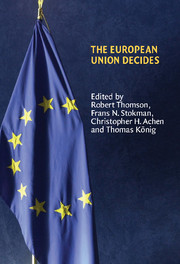Book contents
- Frontmatter
- Contents
- List of figures
- List of tables
- Notes on contributors
- Preface
- 1 Explaining legislative decision-making in the European Union
- 2 Research design: measuring actors' positions, saliences and capabilities
- 3 Testing procedural models of EU legislative decision-making
- 4 Institutional realism and bargaining models
- 5 Compromise, exchange and challenge in the European Union
- 6 Nash versus Schelling? The importance of constraints in legislative bargaining
- 7 A cooperative approach to decision-making in the European Union
- 8 A procedural exchange model of EU legislative politics
- 9 Beyond informal compromise: testing conditional formal procedures of EU decision-making
- 10 Evaluating political decision-making models
- 11 Evidence with insight: what models contribute to EU research
- Appendix I Selection of Commission proposals
- Appendix II Comparison of expert judgements with each other and with information from Council documentation
- References
- Index
- Title in this series
9 - Beyond informal compromise: testing conditional formal procedures of EU decision-making
Published online by Cambridge University Press: 22 September 2009
- Frontmatter
- Contents
- List of figures
- List of tables
- Notes on contributors
- Preface
- 1 Explaining legislative decision-making in the European Union
- 2 Research design: measuring actors' positions, saliences and capabilities
- 3 Testing procedural models of EU legislative decision-making
- 4 Institutional realism and bargaining models
- 5 Compromise, exchange and challenge in the European Union
- 6 Nash versus Schelling? The importance of constraints in legislative bargaining
- 7 A cooperative approach to decision-making in the European Union
- 8 A procedural exchange model of EU legislative politics
- 9 Beyond informal compromise: testing conditional formal procedures of EU decision-making
- 10 Evaluating political decision-making models
- 11 Evidence with insight: what models contribute to EU research
- Appendix I Selection of Commission proposals
- Appendix II Comparison of expert judgements with each other and with information from Council documentation
- References
- Index
- Title in this series
Summary
INTRODUCTION
Quantitative analysis of European Union decision-making can be divided into two distinct traditions. First, there is a camp representing the cooperative approach; this includes the power index approach, the compromise model and cooperative bargaining and coalition formation models. A common feature of these models is that they do not consider explicitly how the outcome of the decision-making process is arrived at. Instead, it is assumed that a compromise among the actors is reached that is a result of their formal or informal capabilities, their information-gathering capacities, and/or the interaction and coalition formation among them. Using rather general assumptions about these elements, the cooperative approach derives solution concepts that also give predictions of decision outcomes.
As noted in Chapter 4, many studies of governmental decisions divide the process into two stages. The first stage is that of compromise-seeking or coalition-formation and has very few formal rules. The second stage consists of the application of the decision-making procedure, where there are explicit written rules and the sequence of moves is specified. The co-operative approach corresponds roughly with the first stage. It makes either no assumptions concerning the second stage at all, or it (implicitly) assumes that all aspects of the second stage of relevance to compromises or coalition formation have been taken into account during the first stage of the process. This approach also presumes that the compromises made in the first stage are binding.
- Type
- Chapter
- Information
- The European Union Decides , pp. 239 - 263Publisher: Cambridge University PressPrint publication year: 2006
- 4
- Cited by



